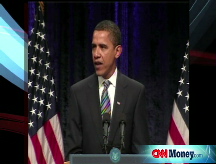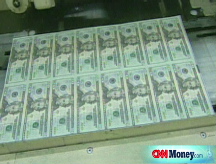The case for doing nothing
Some argue there is a greater risk of long-term damage if Congress passes a big stimulus bill for the economy, which these experts say is already on the rebound.
NEW YORK (CNNMoney.com) -- Congress will soon debate what kind of economic stimulus package should be passed, but some economists are increasingly wondering whether it's a good idea to approve any stimulus at all.
President-elect Obama again called for quick action Thursday on a yet-unspecified economic stimulus plan that could cost as much $800 billion.
Yet, some argue that the economy is already poised to rebound on its own. They point to steep rate cuts by the Federal Reserve and trillions of dollars in loans and assistance approved by the government in the past year as enough stimulus to get the economy back on track.
In addition, some stimulus skeptics believe that increased government spending will cause more problems than they solve.
Brian Wesbury, chief economist at First Trust Portfolios, said the current economic downturn is due to the financial panic that occurred in September after the bankruptcy of Lehman Brothers. That caused a crisis in financial markets and led to the controversial bailout of Wall Street firms and banks and many new programs by the Fed.
Wesbury said consumers and businesses were more reluctant to spend after the collapse of Lehman led to concerns about how other banks would be in danger if a bailout was not passed.
He said he now fears that similar talk about how bad the economy could get if there isn't a stimulus package could cause further declines in spending.
"In the middle of trying to sell a humongous new stimulus package, we'll be creating new panic," he said.
Wesbury acknowledges his view is a minority one, but he's hardly alone. He and Bob Brusca of FAO Economics said they both see signs that the economy might be ready to turn around already, including an unusually large drop in initial jobless claims this week, and a slight increase in the Conference Board's December reading on business activity in the service sector.
Other economists expressed concerns about the longer-term damage that could be done to the economy by spending so heavily to fix short-term problems.
Peter Schiff, president of Euro Pacific Capital, an investment firm specializing in overseas investments, wrote in a research note the stimulus debate has not done enough to focus on the cost to taxpayers that will come from the programs.
"The truth is that the only way out of this mess is less government, more savings, and increased production," Schiff wrote. "Obama's plan is a recipe for economic ruin."
Wesbury said he is pleased by various tax cut proposals being discussed as part of the plan, but he is worried that taxpayers will still have to eventually foot the bill for all the new government spending.
He said the only way to pay for stimulus is by taxing those who are productive, joking that the plan is more like a Ponzi scheme than any creation of wealth.
"Every time we bail somebody out, we have to get that money from somebody else. It's like [Bernard] Madoff," he quipped, referring to the financier accused in a $50 billion securities fraud case.
Other economists added that many of the steps taken so far have not yet had a chance to work. Those efforts may prove to be sufficient enough to stimulate the economy without additional spending.
But since there is so much uncertainty about the economy, some think the government can't afford to wait to see what happens next, especially since this recession is much different in nature than previous ones.
"We have an unprecedented financial crisis being met by an unprecedented policy response," said David Kelly, the chief market strategist for JPMorgan Funds. "The problem is, forecasters work off precedent."
Kelly said he's particularly worried that the economic stimulus plans being discussed, such as construction projects, will take too long to make an impact. Even sending out tax rebate checks, as was done last year, won't necessarily spur spending if people are nervous about the economy.
Kelly said he would prefer cash incentives from the government specifically designed for people to go out and buy a car or a house as a way to jump-start those two battered sectors.
He said the incentive program could be set up so that the amount of money available could drop the longer people take to make the purchase. That way, people willing to spend sooner rather than later would be rewarded and the economy could rebound more quickly.
"The big problem here is we've got a wait-and-see economy," said Kelly. "'Wait and see' are the three most dangerous words in economics."
Brusca agreed that there are major risks of the economy continuing to weaken further. He said that even though "there's a case for not doing anything more," Congress can't afford to wait to act.
"It is gambling on something you can't afford to lose," he said. "You run the risk, if you are being patient, of becoming the patient."
Finally, there are some who believe that the actions taken so far by Congress and the Bush administration, like the $700 billion Troubled Asset Relief Program, or TARP, for banks and Wall Street firms, have done little to help consumers and businesses so far.
"You need something to start the engine," said Rich Yamarone, director of economic research at Argus Research. "Just having a full tank of gas doesn't get you anywhere. TARP is just a full tank of gas." ![]()



